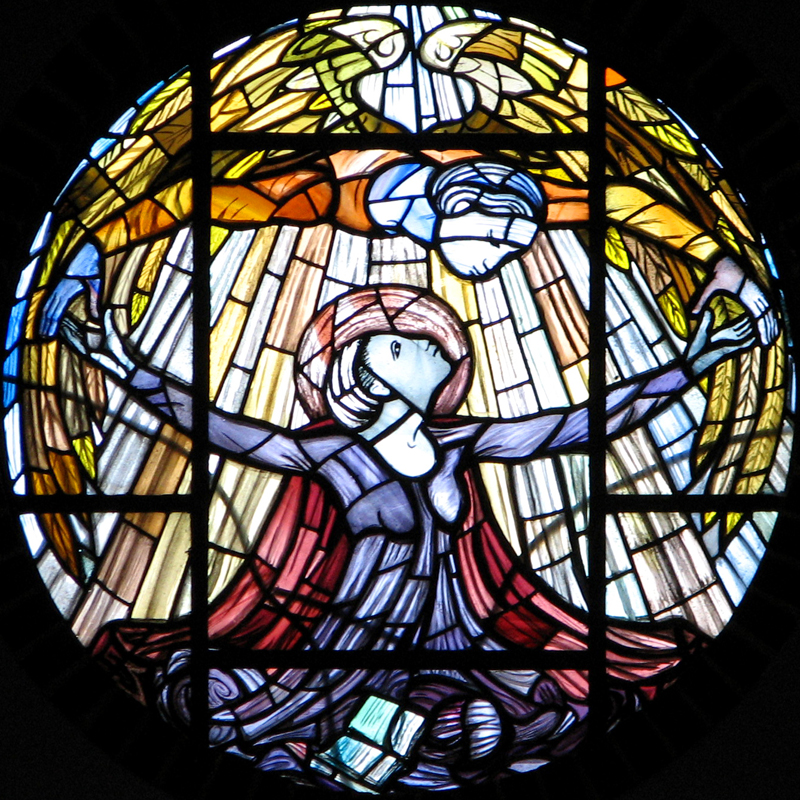
Revised Common Lectionary Reflection, Fourth Sunday of Advent, Year B
December 20, 2020
Lessons: 2 Samuel 7:1-11, 16; Luke 1:46b-55; Romans 16:25-27; Luke 1:26-38
Theme: God’s faithful and generous people know that with God all things are possible, and we are invited to be present and active in the midst of possibility.
Key Scripture: For nothing will be impossible with God. — Luke 1: 37
This week we light the fourth candle on the Advent Wreath, often referred to as the Angel’s Candle. This candle symbolizes peace and justice announced by the angels and the incarnation of Christ. Peace and justice are possibilities for our world even when it seems so unlikely. We know this from brave Mary’s song and from the Angel Gabriel’s announcement of Mary’s pregnancy and role as “God-bearer” or “Theotokos.” He continues “For with God all things are possible.”
In this time of pandemic, unrest, anger, and suffering, Christians still see the possibilities for a different world, one where the way of Christ breaks in and illumines the shadows of despair, shatters the bonds of evil, and welcomes all to the table equally with divine love and mercy.
2 Samuel 7:1-11, 16: This lesson reminds us that faithful people throughout time, in this case King David, have assumed God’s will when in reality they are listening to their own needs, fears, hopes, etc. David has just returned home victorious with the Ark of the Covenant. He has a palace, but the Ark has no place to rest, aside from a tent. Institutions are known to make decisions in the interest of self-preservation, and the church is no exception.
God makes it clear through David’s prophet, Nathan, that the king will not build a temple. God has other plans for how the divine will work with humankind. In verse 11b, God says, “Moreover the LORD declares to you that the LORD will make you a house.” God has been working in, through, among, and even in spite of Israel all this time. God has been with God’s people all along, and the incarnation through the line of David will fulfill prophecy and divine intent.

Luke 1:46b-55: The alternate psalm for today is Mary’s resistance song. It is still timely for us today as we grapple with abuses of power, hunger, homelessness and economic distress, and pandemic. Mary’s words speak how God through the Christ intends to turn the “way things are” into a new world order with preferential treatment for those who have so long been on the margins. Clearly, Mary knew something about the importance of what was happening to her and to Elizabeth. She takes her role as prophetic voice and joins the chorus of prophets and singers in the tradition of resistance that continues to this day. Preachers and worship leaders have a great opportunity to focus on Mary’s story and how her song is still a song for our time and context.
Romans 16:25-27: We are usually charged with either keeping secrets or telling them. Sometimes we live in the tension between keeping and telling. In the closing verses, or benediction, of Romans Paul lets his audience know that this secret’s time has come. Not only are we to share the good news of this mystery/secret, we are also to give the glory to God, through Jesus Christ. Yes, we who have been steeped in the story of Jesus know this good news; we have the rest of the story. Yet we still give all the praise, honor, and glory to God who has done, is doing, and will continue to do new things through the Christ who has broken through all that binds humankind.

Luke 1:26-38: Today’s gospel is Mary’s Annunciation. The angel Gabriel comes to the young woman and announces that she has been chosen to bear God into the world. Clearly, she is a deep thinker and wise beyond her years. She asks only one question: “How can this be, since I am a virgin” (Luke 1:34)? Gabriel gives her an answer that would likely have raised even more questions in Mary’s mind. Then he tells her that Elizabeth, her relative, who is beyond child-bearing years, is also expecting a child. That seems to be enough for Mary to give her assent: Here I am, God’s servant; let it be as you say.
Today we argue over such topics as whether there could have been a virgin birth or whether one considers the lyrics to “Mary did you know?” to be odious or just plain theologically bereft. How might we let the wonder and mystery of the incarnation wash over us as tangibly as it did Mary? Can you imagine how her life was altered? In giving her assent she risks death by stoning, but clearly she doesn’t waver. She senses the possibility of what God is up to as surely as she feels the quickening of life in her womb. And she is not shaken but rather is all-in. May we today be all-in as “God-bearers” to our world and place and time.
In Worship
A wise colleague reminds ministers that a congregation’s depth of spirituality will never exceed that of its leader(s). It is our job to tend to the soul care and spiritual growth of those who comprise Body of Christ (or Bodies if you serve more than one congregation!). That means the most important thing we can do is faithfully and authentically lead worship. Don’t worry if St. Hildegard’s by the Highway has technically flawless live worship on Facebook or First Church by the mall has a professional staff to manage social media and record and professionally edit worship. You know your people. You know their needs. Nothing trumps authenticity, so be authentically you and give them an extra dose of hope. We have the best news in the world to share, so don’t be afraid. You are enough. Your love and care extend far beyond YouTube and Zoom.
Today remind worshipers that we do live in the promise of possibility, and that promise is still good today. We stand on the shoulders of the faithful across time and context, and we will make our own contribution to that long faith narrative for future generations.
Digital Tip: Structure your sermon to be shorter and more interactive. Post on social media or ask questions and invite worshipers to post comments. Consider posting questions or important points as a PDF before worship.
With
Youth
Help youth understand the social, political, and economic situation of first
century Palestine. Then share Mary’s Magnificat with them. Ask how radical
these words sound to them. Would Mary’s words be considered radical by today’s
standards? Do we share any of the same challenges and problems as people did in
Mary’s time? What is different? Remind youth that Mary is called “Theotokos” or
God-bearer. Tell them that we are all God-bearers, too. We are responsible for
bearing the good news of Jesus to the world. What kind of song might we sing
today? Challenge youth to write lyrics or music for a modern version of Mary’s
song.
With
Children
This week’s focus verse is Luke 1:37 – For nothing
will be impossible with God.
This week we hear the story of Mary and the Angel Gabriel, who tells her that she has been chosen by God to bring Jesus into the world. We also learn that Elizabeth, a relative of Mary who is supposed to be too old to have children, is six months pregnant. Then we hear Mary sing a song about how God is doing miraculous things and turning expectations upside down and inside out. What seems impossible is possible when God’s involved.
Sometimes we forget that all things are possible with God. We love and serve a God of possibility, a God who wants us to be happy and well. That’s why Jesus came into the world—to make God’s love known. And now, as Christ’s church, it’s up to us to keep sharing that good news and to remind everyone that nothing is impossible with God.
Finish with a simple echo prayer and blessing.
Dear God (Dear God),
Thank you (Thank you) for loving us (for loving us). Thank you for being a God (Thank you for being a God) of possibility (of possibility). Thank you for Jesus (Thank you for Jesus), and thank you for Mary (and thank you for Mary).
Keep us from fear (Keep us from fear). Keep us hopeful (Keep us hopeful). Make us helpful (Make us helpful). Give us peace (Give us peace). Amen (Amen).
Weekly
Stewardship Bulletin Insert
Being a faithful steward also means being ready for God to
change your plans and priorities. We can take a cue from Mary and be open to
God’s messengers among us, for “with God nothing is impossible.”
Stewardship
at Home
How would you like to see the world change for the better in
2021? Spend some time this week thinking about that and talking about it with
family members or friends. Once you’ve identified what you’d like to see
change, ask yourself if God is calling you to be part of that change. Pray
about it and listen for God’s guidance or a nudge from the Spirit. Remember,
you don’t have to fix everything, but we are called to show up and work for a
better world in the name of Christ. Remember, with God nothing is impossible.
2017 Reflection: https://www.stewardshipoflife.org/2017/12/do-not-be-afraid-bridging-advent-and-christmas/
2014 Reflection: https://www.stewardshipoflife.org/2014/12/stewards-of-advent-time-be/
2011 Reflection: https://www.stewardshipoflife.org/2011/12/life-beyond-the-usual/
Note: Reprint rights granted to congregations and other church organizations for local, nonprofit use. Just include this note: “Copyright (c) 2020, Rev. Sharron Blezard. Used by Permission.” Other uses, please inquire: thewritelife@hotmail.com.



Leave a Reply